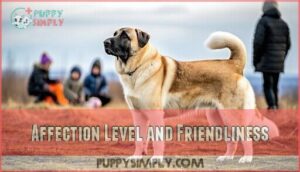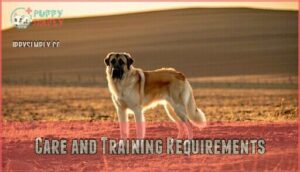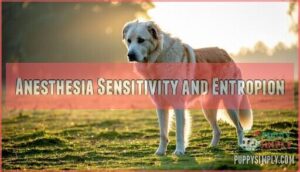This site is supported by our readers. We may earn a commission, at no cost to you, if you purchase through links.

The Anatolian Shepherd Dog isn’t your typical family pet—these independent thinkers weigh 80-150 pounds and stand up to 29 inches tall.
They’re fiercely loyal to their families but naturally suspicious of strangers, making them excellent guardians but challenging for inexperienced owners.
Their thick double coat requires regular brushing, and they need plenty of space to roam.
These dogs think for themselves and won’t blindly follow commands, which can frustrate owners expecting typical obedience, due to their unique blend of independence, protective instincts, and specific care requirements that determines whether you’re truly ready for this remarkable yet demanding breed, requiring a deep understanding of their needs.
Table Of Contents
- Key Takeaways
- Anatolian Shepherd Overview
- Temperament and Personality
- Care and Training Requirements
- Health and Wellness Considerations
- Ownership and Lifestyle Suitability
- Frequently Asked Questions (FAQs)
- What is the life span of an Anatolian Shepherd?
- Is an Anatolian Shepherd the right dog for You?
- Is the Anatolian Shepherd the right dog for your family?
- What is Anatolian Shepherd dog breed most similar to?
- Is a Great Pyrenees bigger than an Anatolian Shepherd?
- Why is my Anatolian Shepherd so aggressive?
- How much does an Anatolian Shepherd Dog cost?
- What type of diet should be provided to an Anatolian Shepherd?
- How should Anatolian Shepherds be trained and what are some behavior tips?
- What are the exercise and activity requirements for Anatolian Shepherds?
- Conclusion
Key Takeaways
- You’ll need extensive experience and large secure space – these 80-150 pound giants aren’t suitable for apartments or first-time owners due to their independent nature and need for territory to patrol.
- You’re getting a working guardian, not a family pet – they’re naturally suspicious of strangers, reserved with children, and bred to make independent decisions rather than follow commands blindly.
- You’ll face significant training challenges – their livestock guardian instincts mean they think for themselves and won’t respond to typical obedience training methods, requiring consistent leadership and early socialization.
- You’re committing to substantial care requirements – expect weekly grooming that becomes daily during shedding seasons, potential health issues like hip dysplasia and anesthesia sensitivity, and 60+ minutes of daily exercise with mental stimulation.
Anatolian Shepherd Overview
You’re considering an Anatolian Shepherd Dog, a massive working breed that originated in Turkey over 6,000 years ago as a livestock guardian.
This independent, protective giant requires experienced ownership and isn’t your typical family pet—they’re serious working dogs bred to make life-or-death decisions while protecting flocks from predators, showcasing their role as a guardian.
Breed History and Origin
The Anatolian Shepherd Dog’s ancient ancestry traces back over 6,000 years to Turkey’s Anatolia region.
You’ll find this breed descended from ancient Mesopotamian dogs, specifically developed for flock guardianship against predators like wolves and bears.
Turkish shepherds selectively bred these dogs for climate adaptation, creating a resilient guardian perfectly suited to Anatolia’s harsh conditions with freezing winters and scorching summers, making them well-adapted for their role as a guardian.
Physical Characteristics and Size
These impressive giants showcase remarkable Size Variation between genders, with males reaching 29-32 inches and 110-150 pounds, while females measure 27-31 inches and 80-120 pounds.
Their broad Head Shape features strong jaws and almond-shaped eyes, complemented by triangular ears and distinctive sickle-shaped Tail Carriage.
This large breed’s substantial frame reflects their ancient guardian heritage.
Coat Types and Colors
Your Anatolian Shepherd’s double coat comes in stunning color genetics variations including fawn, brindle, white, gray, sable, and tan.
Many dogs display distinctive mask variations on their faces.
This weather-resistant fur requires weekly grooming needs during normal periods, but expect increased shedding frequency during spring and fall seasons when brushing becomes essential for managing loose fur.
Lifespan and Health Expectations
How long can you expect your Anatolian Shepherd to be your loyal companion? These remarkable dogs typically live 11-13 years, with some reaching 15 years through excellent preventative care.
Their lifespan faces challenges from genetic predispositions including hip dysplasia, bloat risk, and weight management issues.
Regular exercise impact positively influences dog health conditions, while proper nutrition and veterinary monitoring help address common dog health issues and extend their years as your steadfast guardian.
Temperament and Personality
You’ll discover that your Anatolian Shepherd possesses a complex personality shaped by centuries of independent livestock guarding work.
Understanding their protective instincts, stubborn independence, and reserved nature is essential for building a successful relationship with this powerful breed.
Loyalty and Protective Instincts
Your anatolian shepherd dog views you as their flock, making family guardianship their primary mission.
These loyal giants see you as part of their flock to protect.
This loyal guardian dog demonstrates unwavering protective instincts toward household members while maintaining constant vigilance against stranger danger.
Their territorial behavior stems from centuries of livestock protection breeding, creating a natural alarm system.
These protective tendencies make them exceptional at breed-specific guardian roles, though their loyalty runs deeper than simple territorial instincts.
Independence and Stubbornness
You’ll discover your Anatolian Shepherd marches to their own drumbeat. These dogs possess remarkable Breed Intelligence but channel it through Independent Training approaches that challenge traditional methods.
Their stubbornness isn’t defiance—it’s selective listening based on centuries of Problem Solving livestock threats independently.
Consistent training using firm Leadership Styles works best, though you’ll need creative Stubborn Solutions when standard techniques fail against their natural trainability limits.
Be prepared for a similar experience, as some breeds require consistent positive reinforcement during training.
Affection Level and Friendliness
Don’t expect a lapdog when you welcome this breed into your home.
Anatolian Shepherds demonstrate low family affection and minimal stranger friendliness compared to typical companion breeds.
Their dog temperament prioritizes protection over playfulness level, showing reserved behavior with children and limited pet compatibility.
This family dog exhibits cautious dog sociability, making family compatibility challenging for those seeking an openly affectionate companion.
Energy Level and Exercise Needs
Despite their impressive size, Anatolian Shepherds aren’t high energy athletes requiring constant entertainment.
You’ll find they need moderate daily walks and mental stimulation rather than intense physical activity.
These large breed guardians prefer purposeful exercise like patrolling their territory over fetch games.
Outdoor living suits their independent nature, allowing them to self-regulate activity levels while maintaining their protective instincts.
Care and Training Requirements
Caring for an Anatolian Shepherd requires dedication and understanding of their unique needs as independent working dogs.
You’ll face specific challenges in training, exercise, grooming, and socialization that differ substantially from typical family breeds, which demands a thorough understanding of their unique needs.
Exercise and Activity Needs
Your Anatolian Shepherd needs at least 60 minutes of daily walks and outdoor activities to stay healthy.
These high energy dogs thrive with jogging needs met through structured exercise routines. Mental stimulation proves equally important – puzzle toys and varied outdoor living environments prevent boredom.
Large breed exercise requirements include consistent play time that challenges both body and mind effectively.
To manage their energy levels, owners can benefit from understanding energy release techniques to prevent destructive behavior and promote a healthy lifestyle. Owners should focus on mental stimulation and provide daily walks to keep their dogs engaged, and learn about energy release techniques to ensure their pets lead an active life.
Training Techniques and Challenges
Training your Anatolian Shepherd requires patience and strategic approaches. These independent thinkers won’t simply follow commands like other breeds.
These guardian giants think for themselves—your job is guiding, not commanding.
Positive reinforcement works best, but you’ll need consistent training sessions and an experienced owner’s mindset to overcome their natural stubbornness and guard instincts.
- Start obedience training at 8 weeks using short, frequent sessions with food rewards
- Use firm but gentle leadership to establish respect without breaking their confident spirit
- Employ socialization methods early to prevent fear-based reactions and territorial aggression
Understanding the importance of early imprinting techniques is essential for successful training.
Socialization and Interaction Needs
Socialization shapes your Anatolian Shepherd’s ability to form healthy social bonds and navigate family dynamics effectively.
Start early introductions to establish proper pack hierarchy within your household. Controlled human interaction during puppyhood prevents fearfulness while maintaining their natural guarding instincts.
Strategic canine introduction helps determine pet compatibility, though these dogs often prefer livestock over other pets. Their family suitability depends on consistent socialization throughout dog training sessions, which is crucial for developing healthy social bonds and ensuring they can navigate family dynamics effectively.
Grooming and Coat Care
Your Anatolian’s dense double coat demands weekly brushing year-round, with daily sessions during spring and fall shedding seasons.
Use a slicker brush for mat removal and undercoat rakes for shedding control.
Monthly bathing keeps their weather-resistant coat clean without stripping natural oils.
Regular nail trimming every 3-4 weeks prevents overgrowth and discomfort during their active lifestyle.
For effective grooming, understanding the proper use of a slicker brush tool is essential for coat maintenance.
Health and Wellness Considerations
Your Anatolian Shepherd’s size and genetics make them prone to several health conditions that require proactive management.
Understanding these potential issues helps you provide better care and catch problems early through regular veterinary monitoring, which is crucial for their overall well-being and requires regular veterinary monitoring.
Common Health Issues and Genetics
Your Anatolian Shepherd faces several genetic disorders that responsible owners should understand.
Hip dysplasia affects roughly 10% of the breed, while elbow dysplasia and autoimmune thyroiditis create additional concerns.
These dogs also carry risks for gastric dilatation-volvulus and anesthesia sensitivity.
Health testing through OFA clearances helps identify potential issues early, reducing inheritance of orthopedic problems in future generations.
To mitigate these risks, owners should research reputable breed health information to make informed decisions about their breed health.
Anesthesia Sensitivity and Entropion
Two significant health concerns require your attention with Anatolian Shepherds.
Anesthesia sensitivity means your dog faces heightened risks during surgery, including potential hyperthermia and prolonged recovery.
Always inform veterinarians about this breed-specific issue before procedures.
Entropion causes the eyelid rolls inward, creating eye irritation and requiring surgical correction in moderate cases.
Regular veterinary check-ups are essential for maintaining overall dog health checks to identify potential issues early on, ensuring overall health and addressing concerns like eye irritation.
Hip Dysplasia and Elbow Dysplasia
Large breeds like Anatolian Shepherds face elevated risks for hip dysplasia and elbow dysplasia, affecting joint health throughout their lives.
These canine orthopedics conditions stem from dysplasia causes including genetics and rapid growth.
Hip dysplasia impacts 13% of the breed, while elbow dysplasia and osteochondrosis dissecans (OCD) create joint-related issues requiring arthritis management.
Severe cases may need hip replacement surgery for maximum mobility.
Nutrition and Dietary Needs
Your Anatolian Shepherd’s nutritional foundation starts with understanding their unique dietary needs.
Adult dogs require 2,000-2,800 calories daily, with working dogs needing 25% more.
Choose high-quality dog food containing 22-26% protein and 8-12% fat.
Establish a consistent feeding schedule with two meals daily to prevent bloat.
Consider dietary supplements for joint health, but consult your veterinarian first for proper meal planning.
For ideal growth, consider a diet rich in high protein components.
Ownership and Lifestyle Suitability
Deciding whether an Anatolian Shepherd fits your lifestyle requires honest assessment of your living situation and experience level.
These powerful guardian dogs aren’t suitable for every household and demand owners who understand their unique needs and independent nature.
Family Suitability and Child Compatibility
When considering Child Safety and Family Dynamics, you’ll find these dogs aren’t typical family-friendly companions.
While they tolerate children, they don’t actively engage in play with kids.
Their protective instincts can create challenges in Household Harmony, especially with visiting children.
Proper Socialization Needs and consistent Parental Guidance help, but they’re better suited for families with older, respectful children who understand boundaries.
Compatibility With Other Pets
Your Anatolian Shepherd’s compatibility with other pets depends heavily on early socialization and proper pet introduction methods.
Without early exposure, their protective instincts can create challenges in multi-pet homes.
- Early socialization during puppyhood substantially improves canine coexistence with household animals
- Established animal hierarchy helps Anatolians accept cats and small pets as family members
- Livestock compatibility comes naturally, but flock dynamics require supervised integration with other dogs
Space and Living Requirements
Your Anatolian Shepherd needs substantial room to roam. These giants require large yards with secure fencing – at least six feet tall to contain their impressive size.
Apartment living won’t work. Rural settings with ample space suit their roaming tendencies best.
Without proper outdoor requirements met, you’ll face a restless, destructive companion who needs room to patrol. To guarantee their safety and security, consider investing in high quality large dog fences to prevent escape and protect your pet.
To ensure their well-being, providing the right environment is crucial, with secure fencing being a top priority.
Time Commitment and Owner Experience
You’ll need to dedicate substantial time to this breed’s daily schedules and training demands.
Experienced owners understand that commitment requirements include 10+ hours weekly for consistent training using positive reinforcement methods.
These high-energy, stubborn dogs require owner dedication beyond basic care.
Time management becomes critical when addressing their independent nature.
Without proper experience levels and persistent effort, you’ll struggle with their strong-willed personality and protective instincts.
Understanding the needs of high energy breeds is essential for providing the right environment and care for the Anatolian Shepherd Dog.
Frequently Asked Questions (FAQs)
What is the life span of an Anatolian Shepherd?
You’ll typically enjoy 11 to 13 years with your furry guardian, which is impressive longevity for such a large breed that weighs up to 150 pounds.
Is an Anatolian Shepherd the right dog for You?
Before you fall head over heels, consider this: you’ll need acres of space, hours for training, and nerves of steel.
These independent giants aren’t cuddly lapdogs—they’re serious working dogs requiring experienced handlers.
Is the Anatolian Shepherd the right dog for your family?
Anatolian Shepherds aren’t right for most families. They’re independent, reserved giants requiring experienced owners, large secure yards, extensive training, and aren’t kid-friendly or apartment-suitable pets.
What is Anatolian Shepherd dog breed most similar to?
You’ll find this breed shares the most similarities with Great Pyrenees, Kangal, and Akbash dogs.
These livestock guardian breeds display comparable protective instincts, independent temperaments, and territorial behaviors that define their working heritage, which are key to their protective instincts.
Is a Great Pyrenees bigger than an Anatolian Shepherd?
Size matters when you’re choosing between giant breeds.
Great Pyrenees males typically reach 100-160 pounds and stand 27-32 inches tall, while Anatolian Shepherds weigh 110-150 pounds and measure 27-31 inches.
You’ll find both breeds remarkably similar in size overall, with the main distinction being their weight and height, but both are giant breeds, making size a crucial factor.
Why is my Anatolian Shepherd so aggressive?
Your dog’s aggression stems from protective instincts bred for livestock guarding.
They’re naturally suspicious of strangers and territorial.
Early socialization, consistent training, and establishing clear leadership help manage these behaviors effectively.
How much does an Anatolian Shepherd Dog cost?
Picture buying a luxury car – you’re investing big upfront, then paying for premium maintenance.
You’ll spend $1,200-$3,000 initially for your Anatolian Shepherd puppy, plus $650-$1,000 annually in veterinary costs due to their giant size and potential health issues.
What type of diet should be provided to an Anatolian Shepherd?
You’ll want to feed your Anatolian Shepherd high-quality protein from sources like chicken, beef, or fish.
Choose large-breed formulas with balanced calcium and phosphorus to support proper bone development and prevent joint issues.
How should Anatolian Shepherds be trained and what are some behavior tips?
Start early training between 8-16 weeks using positive reinforcement and firm, confident commands.
You’ll need consistent leadership because they’re independent and stubborn.
Socialize them gradually with controlled exposure to different people and environments, using firm commands.
What are the exercise and activity requirements for Anatolian Shepherds?
Exercise requirements demand at least 60 minutes daily for these independent guardians.
You’ll need hiking, walking, and mental stimulation rather than fetch games.
They’re bred for endurance, patrolling territory naturally, so provide secure space for roaming.
Conclusion
Don’t bite off more than you can chew when considering an Anatolian Shepherd Dog.
These magnificent guardians aren’t suited for everyone despite their impressive qualities.
You’ll need extensive experience, adequate space, and patience for their independent nature.
The Anatolian Shepherd Dog demands consistent training, proper socialization, and understanding of their protective instincts.
If you’re prepared for the commitment, you’ll gain a loyal, capable companion who’ll dedicate their life to protecting your family.
- https://www.thekennelclub.org.uk/search/breeds-a-to-z/breeds/pastoral/turkish-kangal-dog/
- https://en.wikipedia.org/wiki/Anatolian_Shepherd
- https://www.fws.gov/sites/default/files/documents/endangered-species-act-accessible.pdf
- https://www.facebook.com/nasrnrescue/
- https://www.hiddenoakshomestead.com/post/raising-anatolian-shepherds-the-importance-of-training-and-imprinting
















